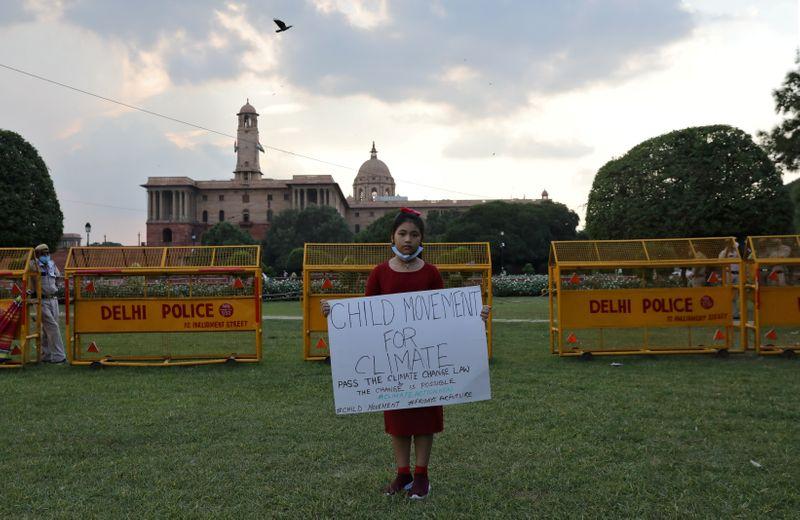Rising Heat Has Severe Implications For Water Security: CSE
Mar 24, 2022 | Pratirodh Bureau
FILE PHOTO: Licypriya Kangujam, 8, a young Indian climate activist, holds a poster during a protest demanding to pass a climate change law outside Parliament in New Delhi
The intense heatwave that has gripped large parts of India so early this summer is proof that this is the age of climate change and it can have severe implications for water security, the Centre for Science and Environment has said.
Speaking on the occasion of World Water Day, CSE Director General Sunita Narain said climate mitigation has to be about water and its management.
“What does this intense heat wave that has hit large parts of India so early this summer really mean? It means, especially today, as we mark the World Water Day, that this is the age of climate change. It also means that how we deal with our water in the coming days will determine whether we would survive such extreme climatic conditions. We all know that climate change impacts are about increased heat and scorching temperatures, and about variable and extreme rain. Both have a direct correlation with the water cycle. Therefore, climate change mitigation has to be about water and its management,” Narain said.
India is witnessing a repeat of 2021 conditions, when temperatures touched 40 degrees Celsius as early as February in some parts of the country, said Avantika Goswami, deputy programme manager, climate change, CSE.
“This was when 2021 was the year of the La Nia, the Pacific water currents that are known to bring cooler temperatures globally. Indian weather scientists have informed that global warming has offset this cooling effect of La Nia,” Goswami said.
CSE researchers pointed out that rising heat has severe implications for water security and to begin with, it would mean greater evaporation from water bodies.
“It means that we need to work not just on storing water in millions of structures, but also plan for reducing losses due to evaporation. It’s not that evaporation losses did not happen in the past, but the rate of evaporation will now increase with the soaring temperatures,” CSE said.
According to researchers, India’s irrigation planners and bureaucracies have largely depended on canals and other surface water systems; they should not discount the management of groundwater systems.
Increased heat can also lead to drying up of moisture in soil, the CSE said, adding that it will make the land dusty and will increase the need for irrigation.
In a country like India, where the bulk of food is still grown in rain-fed regions, it will intensify land degradation and dust bowl formations. This means water management must go hand in hand with vegetation planning to improve the ability of soil to hold water, even in times of intense and prolonged heat, it said.
The organisation cautioned that heat will drive up the use of water, from drinking and irrigation to fighting fires in forests or buildings.
“We have already seen devastating forest fires rage in many parts of the world, and in the forests of India. This will only increase as temperatures go up. The demand for water will increase with climate change, making it even more imperative that we do not waste — either water or wastewater,” it said.
CSE also said climate change is already showing up in terms of the increasing number of extreme rain events.
“This means that we can expect rain to come as a flood, making the cycle of floods followed by droughts even more intense. India already has fewer rainy days in a year — it is said that it rains for just 100 hours on average in a year. Now the number of rainy days will further go down, but extreme rainy days will increase,” it said.
“We needed to be obsessive about water and its management yesterday because water is the basis of health and wealth. But now we need to be more than obsessive. We need to be determined and deliberate. On this World Water Day, in the age of climate change, we need to know that the water agenda is the real make or break of our future,” said Narain.
